37 Best And Worst Online French Courses For 2023
 Written byJohann Brennan
Written byJohann Brennan- Read time26 mins
- Comments11

Finding the best online French courses can be a daunting task.
French is one of most popular foreign languages in the world - it’s so popular that course and product creators for French education abound.
It’s no surprise that French is so popular - travel to Paris is on everyone’s bucket list - it’s important for business and career advancement, and French is spoken all over the world (not just in France).
If you’re in North America, you have an entire chunk of Canada to visit where French is the first language.
It’s also one of the most beautiful languages to listen to.
So today I’m going to list the best (and worst) of all the popular online French courses available (I’ve tried them all).
As a fluent French speaker, I’ll share my thoughts on what works.
Below you’ll find pros and cons for each course, pricing and a brief summary. In some cases, there’s a review already written on this site which I’ll link to.
Table Of Contents
- Rocket French
- Frantastique
- FrenchPod101
- French Uncovered
- Glossika French
- Pimsleur French
- Mondly French
- italki
- Learn French With Alexa
- French Today
- Mango Languages
- Mimic Method
- News In Slow French
- Memrise/Decks
- Francais Authentique
- Speechling
- Babbel French
- edX
- Coursera
- FluentU
- Yabla French
- Coffee Break French
- Language Transfer
- Lingodeer
- Comme Une Francaise
- French Your Way
- Rosetta Stone
- Lawless French
- Illini
- Duolingo
- Busuu
- Lingoda
- Speaky
- Live Lingua
- Michel Thomas
- FSI
NOTE: Some of the items listed below probably aren’t necessarily considered “courses” for French. The reason I’ve included them is that they’re popular enough French tools to be included.
DISCLAIMER: The comments below are personal opinions and some links are affiliate links.
The best French courses online (most popular French resources)
1. Rocket French

Cost: Starts from $99.95 (auto-applied discount)
Summary: Rocket French is ideal for people who like structure in their learning. If you’re looking for a course that progresses from the basics through to the advanced level material, then this is best. This is my top recommendation for French learners.
Note however - even though you can go in a linear progression, you don’t have to if you prefer to skip lessons and choose your own path.
The Rocket French course is divided up into podcasts that teach French in a fun, clear and relaxing way and straight up natural dialogues and vocabulary. There’s a full range of content delivery styles within the courses. Rocket French’s three course levels cover all language skills equally well, and their inbuilt voice recognition is one of the most accurate I’ve seen (it uses Google’s voice recognition technology).
There’s also an incredibly useful French Travelogue that’s worth every penny for the extra content it adds.
If you’re looking for a French course that ticks all the boxes, Rocket French is it.
Also check out this Rocket French review.
What I like:
- Three comprehensive levels ranging from beginner to advanced (you can buy them individually or in a full package)
- Perfect for structured course learning (though not restrained by it), with a very clear learning path
- Courses cover all 4 major skills evenly (listening, speaking, reading, writing)
- Students are motivated by the inbuilt leaderboard
What I don’t like:
- Largely inactive forum
Join The Guild by clicking here, select French and I’ll send you a unique offer for Rocket French exclusive to my readers only.
2. Frantastique
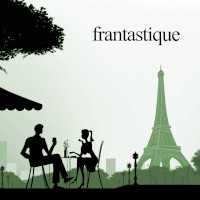
Cost: Basic is 21EUR a month, Premium is 32EUR a month and Pro is 42EUR a month
Summary: Frantastique is a unique and very popular course for French with ‘personalized’ lessons that adapt to your needs and skill level.
You receive corrections and exciting new content sent to you daily. If you take the more expensive options (Premium and Pro), they include teacher support and certifications. Highly recommend this one.
What I like:
- Unique method using French stories
- Premium and Pro offer helpful support and a certified diploma upon completion
- Lessons that adapt to your own learning
What I don’t like:
- Lessons aren’t provided in one hit - they’re released over time
- A little too expensive
3. FrenchPod101

Cost: Begins at $4 a month.
Summary: FrenchPod101 is one of the most popular ‘podcast’ format courses for learning French.
It primarily uses audio lessons but includes video as well (of varying quality). Lessons are suitable for beginners right up to advanced levels. The instruction not only includes listening skills but also incorporates essential vocabulary and grammar. All lesson content is downloadable and there are other features built in to the dashboard.
See this FrenchPod101 review.
What I like:
- Loads of content for lower levels
- Provides cultural insights throughout
- Less English used in higher levels
What I don’t like:
- Could be more advanced level material
- Excessive English in lower level lessons
- Site can be slightly overwhelming with the amount of features offered
UNIQUE OFFER: Use the code MEZZOGUILD to save 25% on any of their French course options.
4. French Uncovered

Cost: One time purchase of $297.
Summary: French Uncovered is another unique way to learn the French language. Olly Richard’s program begins by immediately throwing you into an easy French story and you learn through a “Guided Discovery” method.
Instead of just learning about grammar rules, learners come across them through fictional narrative. It provides a fun and unique way of learning a language, though is slightly expensive.
What I like:
- Unique story-based method
- Clear instructions with lots of practice
What I don’t like:
- May appear overwhelming for new learners
- Seemingly unrelated grammar points thrown into lessons
- Expensive
Read our French Uncovered review.
5. Glossika French

Cost: $30 a month or $24.99 a month billed annually
Summary: Glossika’s one of the most unique and powerful learning tools available for French (especially listening comprehension). It uses a unique algorithm to train you to listen to and repeat French sentences with spaced repetition.
Suitable for all levels, though lower-level learners may find it difficult to understand in the beginning.
See this massive Glossika review and interview.
What I like:
- Uses an intuitive, unique learning approach to “sentence training”
- The subscription allows you to access all languages including French
- Focuses on heavy repetition
What I don’t like:
- May be difficult to understand for new learners
- No explicit explanations of grammatical topics
- Slightly expensive
6. Pimsleur French
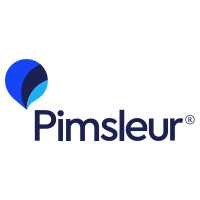
Cost: $14.95 a month subscription (or $119.95 per level)
Summary: Pimsleur’s a household name for learning French using spaced repetition recall. The lessons focus on practical vocabulary and expressions one might need in various scenarios. This includes greetings, common phrases, and vocabulary you might need when visiting France.
The Pimsleur method prepares you for the necessary French you need to get by in your travels in a short period of time. This is one of the best online French courses despite its age, and is an affordable program that can be subscribed to.
Read this Pimsleur review.
What I like:
- Pimsleur is a timeless masterpiece that is based on solid research in second language acquisition
- The course only requires 30 minutes a day of studying (not proven however)
- There is a lot of listening and repeating phrases for easy memorisation
What I don’t like:
- Outdated scenario examples
- Too much English
7. Mondly French

Cost: Starts at $9.99/month.
Summary: Mondly offers courses for dozens of different languages and is similar in style to (derived from) Busuu, Duolingo, and Babbel. There are even hints of Rosetta Stone in the way it teaches.
Mondly’s a beautifully-designed web and mobile app and it’s easy to navigate the course content.
Unfortunately some of the courses aren’t very good (e.g. the Arabic one) but French is done really well.
What I like:
- Great for learning a lot of vocabulary
- Daily lessons, weekly quizzes, monthly challenges
- Beautifully designed
What I don’t like:
- A little too “cookie-cutter”
- Mostly passive exercises
Read this Mondly review.
8. italki
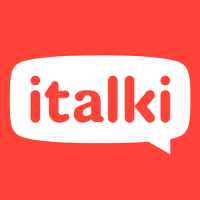
Cost: Prices vary widely
Summary: italki connects French learners with tutors, teachers and conversation partners. As with similar services, it doesn’t a curriculum or content to instructors - just facilitates.
The good thing about italki is their vetted onboarding process for teachers which ensures quality. italki has earned its amazing reputation.
Teachers succeed on italki through client feedback, meaning subpar teachers simply will not cut it on the platform.
What I like:
- Facilitates great connections with expert French teachers.
What I don’t like:
- No set curriculum means you could be paired with an inexperienced new teacher not yet weeded out by italki’s review system.
9. Learn French With Alexa

Cost: $35 monthly, $75 three monthly, $180 per year
Summary: A very popular platform run by an experienced French teacher named Alexa. Her content is excellent and covers pretty much everything related to French.
What I like:
- Good amount of free content available
- High level of support for French
What I don’t like:
- Expensive
10. French Today
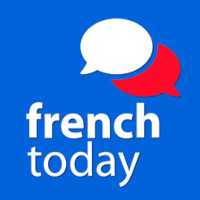
Cost: Range of products that vary in price
Summary: French Today is without doubt the number one course resource for French audiobooks. They have quite a lot of products available and all are superb, covering a range of important French topics (including French poetry).
What I like:
- One of the best audiobook resources for French learners
- Speed variations
What I don’t like:
- Expensive
11. Mango Languages
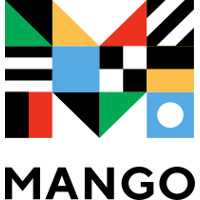
Cost: $7.99 a month (free in public libraries)
Summary: Mango is a well-known yet greatly underrated program for learning French, in my opinion.
The design of this course is simply stunning and it allows you to switch between literal and understood translations. It color codes words and lexical chunks to match the English translation which is great for visual learners. At $7.99 a month, it’s a steal in my opinion.
What I like:
- Very well-designed yet simplistic interface
- Focuses on lexical chunks rather than rules
- Ability to switch between literal and understood translations
What I don’t like:
- Minimal grammar focus
- Lack of content depth for higher-level learners
See this review of Mango Languages.
Other great online French courses
The French courses mentioned above are my personal preference but there are many other quality online course options for French.
Keep reading.
12. Mimic Method French
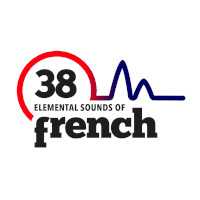
Cost: Mimic Method costs $197 and provides users with lifelong access to their materials.
Summary: Mimic advertises a course that focuses completely on pronunciation (treating language like a melody). The program can be technical and difficult to grasp, but if your only goal is to improve your pronunciation, it may good for you.
This program has an unrealistic price tag of $197.
One of the more unique French methods around and has fantastic reviews.
What I like:
- Unique approach to language mimicry
- In-depth instruction on elemental sounds of French
What I don’t like:
- Way overpriced
- Not a lot of material for the price
13. News In Slow French

Cost: Starts at $16.90 a month.
Summary: News in Slow French is one of the best online French courses for training listening skills.
As learners progress, they began developing greater comprehension as they listen to the news spoken in slow French. This online French course uses diverse tools that include transcripts, lessons, quizzes, and pronunciation.
What I like:
- Provides an innovative way to learn French through slow news
- Learn about news and cultural events
- Immersive learning created by journalists and linguists
What I don’t like:
- May be challenging for beginners
- Is more suited for those that have some knowledge of French
- Not ideal for visual learners
14. Memrise
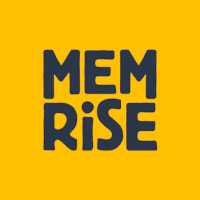
Cost: Free
Summary: Memrise (otherwise called Decks) is one of the more popular online French courses. This course may be best for those looking for a refresher or for those who are interested in building a strong vocabulary in French. It’s main premise is flashcards and repetition.
For a free online French course, Decks is well-designed. It covers lots of topics but you will probably need additional resources to become fluent in French. The Memrise premium course can be purchased for $9 a month or $59 a year (but free Decks are great).
What I like:
- Repetition makes it easy to learn words
- More fun than traditional flashcard apps
- Many courses to choose from
What I don’t like:
- Should be used with other resources or upgrade to the paying version
- Not a main tool for learning French
15. Francais Authentique
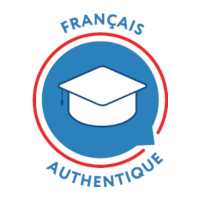
Cost: 49EUR for “Découverte”, 129EUR for “Discussions”, 149EUR for “Vidéos”, 199EUR for “L’intégrale” (full pack)
Summary: Francais Authentique is entirely in French, which means it’s aimed at higher-level students of French who can already navigate the content.
One of the more immersive resources for French, you’ll get some of the most authentic exposure to Intermediate-Advanced French.
What I like:
- Active community of French learners
- Great immersive approach
What I don’t like:
- 100% in French (unsuitable for totally new learners)
- Pricey
16. Speechling

Cost: Free (or plans starting at $19.99 a month which include coaching)
Summary: Speechling is a non-profit that begins French language learning with sentence repetition but encourages more freestyle conversation as lessons progress.
What I like:
- Non-profit organization
- Lots of value in the free plan
- Feedback from native French speakers
What I don’t like:
- Not ideal for new learners of French
17. Babbel French
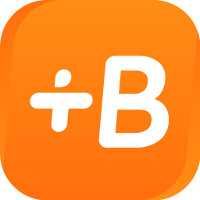
Cost: Subscriptions start at $12.95/month.
Summary: One of the best and most well-known online French courses, Babbel, is a great tool for learning the language and very budget friendly. Babbel’s online French course platform focuses on writing and reading, listening and spelling. It aims to give you all the tools you need to start learning the language immediately. It’s often described as a paid, and more professional alternative to Duolingo (see below).
Babbel is available for businesses who need their employees to learn French.
Read this extensive Babbel review.
What I like:
- Flexibility and variety in their teaching style
- Incorporates several different learning styles to effectively teach French
- Developed by in-house linguists
What I don’t like:
- Uninspiring course
- No downloadable materials
18. edX (On-Ramp to AP(R) French Language and Culture)
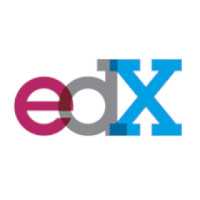
Cost: The 3-week class is free itself, while the certificate of completion will cost you $35.
Summary: edX functions like a classroom, offering courses covering pronunciation, spelling, grammar, and vocabulary. It’s best suited to those looking for a traditional language learning experience that mimics a condense college course. If this structure is what you are looking for, this is the best online French course for you.
Similar to a college course, edX offers to connect students to one another utilizing a discussion board. If you’re a fan of online courses that function like college classes, edX comes about as close to mimicking them as possible without being an actual university course.
What I like:
- edX offers a conventional online classroom feel.
What I don’t like:
- While self-paced, enrolment is strict and classes are offered on a set basis. Missing the enrolment window means waiting for the next round of classes, just as with college courses.
19. Coursera online French courses

Cost: Prices vary widely.
Summary: Coursera courses are for those who have passion for learning French and need a little help for staying on track. These online French courses are offered by 'Ecole Polytechnique at a B1 level.
The courses offer a variety of lessons involving learners from various parts of the world. This online French course teaches basic French with a specialization in vocabulary.
Additionally, learners can enroll in Coursera for college credit. There’s even financial aid for those who can’t afford to pay for it.
What I like:
- Allows people from around the world to be immersed in French-speaking cultures
- Accredited courses
What I don’t like:
- You have to go through 'Ecole Polytechnique to enroll
20. FluentU

Cost: $30 a month (or $20 a month annually)
Summary: FluentU helps students learn French through the use of real-world video content with a video wrapper that enables interactivity. The concept behind this style of instruction is to provide an immersive online ‘course’ (kind of).
Students short clips from French videos and utilize the French and English interactive subtitling.
See this review of FluentU too.
What I like:
- Abundance of video content to learn from (more than most people would ever need).
- Ability to interact with French video subtitles.
What I don’t like:
- Most of the sourced content comes from YouTube which is freely available.
- Pricey for a subscription product.
21. Yabla French
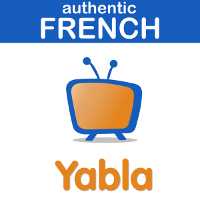
Cost: Starts at $12.95 a month
Summary: Yabla French was the first of its kind - an online French course that uses interactive video (it predates FluentU).
It has a massive library of content that most French students will never find insufficient so theoretically it’ll last you forever.
See this massive review of Yabla.
What I like:
- Enormous collection of French videos to learn from
- Very inexpensive
What I don’t like:
- Clunky interface
22. Coffee Break French
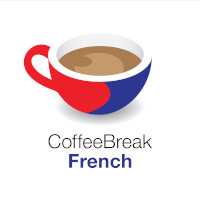
Cost: Prices vary widely depending on course option
Summary: Coffee Break is ideal for the casual learner who prefers a well-structured course for French. They make their audio lessons free through a podcast format. Their premium version is quite expensive.
For those who feel overwhelmed at the idea of learning French, Coffee Break French is a good choice. The lessons are relaxed and provide the feeling of learning with a friend. The program begins by teaching words and sentences and then progresses to putting it all together.
What I like:
- Coffee Break offers a comprehensive, well-structured free audio course
- It provides vocabulary and grammar with detailed explanations
- Lessons begin slowly then progress to mainly French dialogue
What I don’t like:
- No extra materials for the free course
- Expensive for the paid version
23. Language Transfer
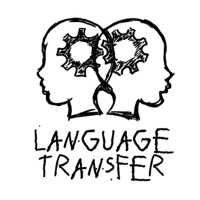
Cost: Free
Summary: Language Transfer is a really handy free French course has 90 audio lessons that last approximately 10 minutes each.
During the lessons, the hosts acts as a teacher while the student learns from them (reminiscient of Michel Thomas). The language is explained in a way that makes sense and provides lots of explanations. This course does not follow a traditional method but does go into a lot of depth.
It’s totally free to use.
What I like:
- Lessons cover a lot of material in 10 minutes
- You get a mix of vocabulary, grammar and pronunciation in each lesson
- It’s free
What I don’t like:
- There are no exercises or quizzes to test learning
- You won’t hear any native speakers or conversations in French
24. Lingodeer

Cost: Starts at $9 a month
Summary: Lingodeer’s both a web and mobile app.
Not as well known as Duolingo, Lingodeer teaches French (and other languages) through a wide variety of exercises. The lessons are in small, manageable chunks. The audio quality is good for an app and the wide selection of lessons keeps learning interesting.
What I like:
- Developed by teachers and contains a grammar-based curriculum
- Provides detailed explanations
- Downloadable Knowledge Cards
What I don’t like:
- Could be structured better
Read this Lingodeer review.
25. Comme Une Francaise

Cost: Prices vary. Starts at 149EUR.
Summary: Run by popular French teacher and influencer Geraldine, Comme Une Francaise is excellent in that it not only covers French language topics, but aims to teach “how to be French”.
Translates to “like a Frenchwoman” but is not gender-specific.
What I like:
- Great focus on French cultural immersion as well as language
- Quality content on their free YouTube channel
What I don’t like:
- Expensive
26. French Your Way
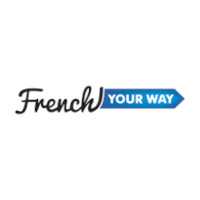
Cost: Free but also sells various French language products
Summary: This one hasn’t been active in several years but still contains plenty of great French content to work through (for free). It’s basically just a blog so nothing overly intuitive about it but it’s a handy resource for any French student.
What I like:
- Doesn’t cost anything
What I don’t like:
- Inactive
Online French courses that are lower on my list
Some online French courses are popular but personally not my cup of tea.
I’ve listed them here.
27. Rosetta Stone French

Cost: Starts at $6.49 a month.
Summary: Rosetta Stone is the most well-known name in language learning and still one of the most popular courses for learning French.
The strength of Rosetta lies in its unique and patented immersion process. Since there is no translation or explicit grammar, you must learn vocabulary, grammar and speaking skills through intuition. The course intuitively promotes learning French through simple language patterns and chunks.
Subscription only now though you can still find copies of the box sets online.
See this incredibly popular review of Rosetta Stone.
What I like:
- No explicit grammar
- Unique learning style based on intuition
- Actually works and is based on research
What I don’t like:
- Frustrating for anyone wanting explanations of French grammar
- Inappropriate cultural images
28. Lawless French
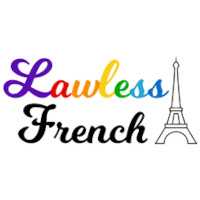
Cost: Free
Summary: Called Lawless because it’s the site owner’s name “Laura Lawless”, Lawless French is basically a comprehensive free blog resource filled with French course content. Extremely useful. There’s also a Spanish version of the same site.
What I like:
- Doesn’t cost anything
- Appealing to all levels of French learner
What I don’t like:
- Basically just a blog (and poorly structured)
29. Illini

Cost: Starts at $6 per month
Summary: Ilini is a fairly new French course option that is quite similar in its approach to FrenchPod101. It has serious potential but at present, lacks course depth (otherwise I’d put it much higher on this list).
What I like:
- Downloadable lessons
- Inexpensive
- High quality video content
What I don’t like:
- Limited amount of content at present
30. Duolingo French

Cost: Free.
Summary: Duolingo is a famous, totally free and crowd-sourced learning platform for many languages including French. It’s addictive and fun with one of the most active polyglot communities behind it.
French is learned through a variety of exercises and lots of repetition through a gamified learning path.
Check out this comparison of Duolingo and Rosetta Stone.
What I like:
- Interactive lessons let you speak and listen in French
- Offers competitive events between friends and interaction with other users
- Its great for an introduction to the language and learning the basics
- Free
What I don’t like:
- The audio voice sounds unnatural
- Not comprehensive enough to become fluent
31. Busuu

Cost: Starts at $5.83 a month.
Summary: Busuu is similar to Babbel, Duolingo, and Lingodeer, however it isn’t as deep and comprehensive as other platforms.
The overall design of Busuu is beautiful but it just lacks depth.
There is a free version of Busuu which features a language exchange section.
What I like:
- Learning platform is well designed
- Language exchange is a free, easy-to-use app
- Very popular online learning program
What I don’t like:
- Program lessons leave a lot to be desired
- Not enough pronunciation and grammar
- Better courses available for free
32. Lingoda

Cost: Ranges from $56 to $760 per month depending on the package you choose
Summary: Lingoda features live, online classes taught by certified teachers residing in France. All of Lingoda’s course materials are designed to meet the European Framework (CEFR). Students will learn the language across multiple formats, including speaking, listening, reading, and writing.
What I like:
- Classes are available 24-7 and students can choose between private lessons or small group classes with typically 3 students each.
- This course also instructs students on the use of “street talk” and the curriculum is highly customizable.
What I don’t like:
- Lessons must be scheduled in advance.
Read this Lingoda review.
33. Speaky

Cost: Starts at $5.99 a month
Summary: Speaky is another option for those looking for a French social app (connecting with other French learners and speakers). There are already several of these apps on the market but Speaky looks promising and is quite active.
What I like:
- Large community
- Includes an app
What I don’t like:
- Buggy
34. Live Lingua

Cost: Begins at $10.99 an hour.
Summary: Live Lingua matches you to a native speaking, private online French tutor and allows you to learn at your own pace. You can even take a free lesson for trial.
While their lessons are moderately affordable for a private tutor, starting at $16 an hour, you can get a discount with a bundle. As a far more affordable alternative, I’d prefer to just use italki myself.
What I like:
- Private one-on-one lessons over Skype
- Provides a wide range of materials for learning French
- Lots of program support
What I don’t like:
- More expensive than other personal language tutors
- Options are not as flexible as other programs
- Uses free courses from other sites
35. Michel Thomas French

Cost: Starts from $11.99
Summary: Michel Thomas is one of the most overrated French courses available in my opinion.
This strictly audio course was developed by Michel Thomas, a Polish linguist who spoke 10 languages.
This course uses no writing or memorizing - it simply builds your French knowledge through teacher-led sessions. Grammar and vocabulary are discussed but are not the emphasis of the lessons.
Read this amazing review of Michel Thomas.
What I like:
- No need to write or memorize
- Grammar is introduced naturally and gradually
What I don’t like:
- Teacher-led.
- Constant error corrections.
- Does not prepare French students for real conversations and listening comprehension
36. FSI
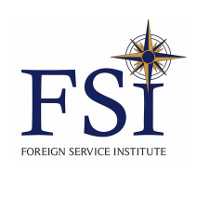
Cost: Free
Summary: FSI (Foreign Service Institute) is a US government program that trains diplomats and government officials in foreign languages, including French. The full course and audio are available online to download from various sites.
The most obvious problem with the FSI material is that it’s extremely dated.
Although you can download the comprehensive, detailed French course of FSI for free with audio, you need to be aware that the material is literally photocopied booklets that were typed up on typewriters making it hard to read.
It has tremendous depth but is so old that most people won’t find it useful.
What I like:
- Free.
- Comprehensive since it’s a diplomat program.
What I don’t like:
- Extremely old and dated material.
Summary: Best online French courses
If I’ve missed an online French course, let me know in the comment section below (but I’m pretty sure I’ve covered nearly all of them).
Whichever French course you choose, daily French practice with native speakers in imperative - ideally in person if you can (even more ideal if you can do French immersion.
italki (mentioned above) is the leading platform for finding affordable French practice partners, teachers and tutors.
But really it comes down to what you want.
You can still fail miserably at French without the right motivation and consistency, no matter which French course you use.
Likewise, even low quality French courses or lists of French phrases can be powerful in the hands of someone with the right attitude and learning style.
If you’re looking for tips on how to learn French and overcoming various language learning struggles, make sure to subscribe below by ‘Joining the Guild’.
Know of a French course that I didn’t mention?
Share it below in the comment section.
 Grab the link to this article
Grab the link to this article